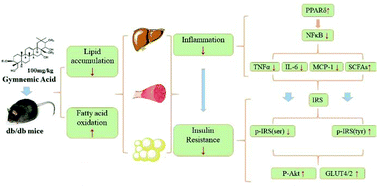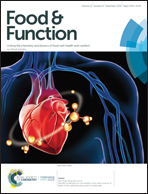Gymnemic acid alleviates inflammation and insulin resistance via PPARδ- and NFκB-mediated pathways in db/db mice
Abstract
Gymnemic acid (GA) is a naturally occurring herbal ingredient that improves glucose metabolism in patients with diabetes mellitus. In this study, we evaluated the ameliorative effects of GA on obesity-induced inflammation and insulin resistance (IR), and identified the mechanisms for these effects in db/db mice. In these mice, GA effectively lowered fasting blood glucose concentrations from 26.3 ± 4.09 to 17.4 ± 3.38 mmol L−1, and improved oral glucose and insulin tolerance. Furthermore, GA treatment accelerated lipid transport and promoted fatty acid oxidation, which reduced lipid accumulation and inhibited expression of inflammatory cytokines, including those involved in the proliferator-activated receptor δ (PPARδ)- and nuclear factor κB (NFκB)-mediated signaling pathways. In addition, the anti-inflammatory effects increased the ratio of insulin to glucagon. It also regulated the insulin signal transduction with reduced phosphorylation of IRS-1 (Ser) and increased phosphorylation of IRS (Tyr) in liver, skeletal muscle and adipose tissue. In summary, we demonstrated in db/db mice that GA induces fatty acid oxidation, and alleviates inflammation and IR in liver, skeletal muscle and adipose tissue through PPARδ- and NFκB-mediated signaling pathways.



 Please wait while we load your content...
Please wait while we load your content...